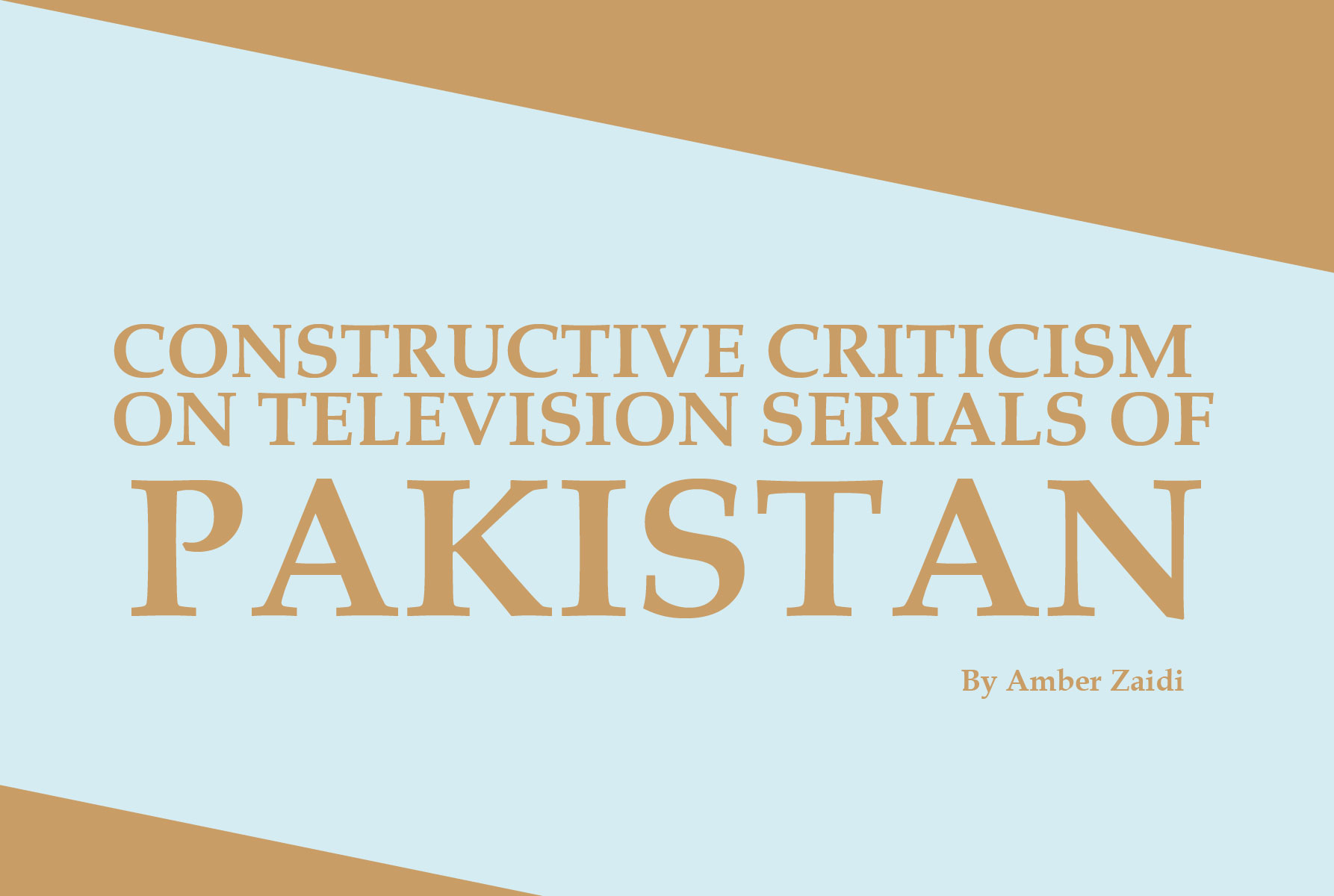PROBLEMATIC NARRATIVE OF PAKISTANI DRAMAS
If we took a glance at approximately 10 to 12 years back, the entertainment industry of Pakistan has not so flourished, as it had faced uncountable crises, lack of resources, and support. In the initial stages, few private production houses took a step ahead and produced serials for the sake of the audience’s entertainment, and ultimately it got effective results. People started watching pure Pakistani content and, with time, the efforts and hard work paid off Pakistani dramas as an industry grew and widened significantly for their captivating subject matters. Meri Zaat Zara e Benishan, the Barat series, Daam, Main Abdul Qadir Hoon, Dastaan, Mere Paas Paas, and Humsafar are plays that belonged to kinds of genres that grabbed the public attention and took the industry to the next level. Meanwhile, showbiz is still going through some critical situations. Nevertheless, new, and exciting dramas get aired monthly without a single break to hook up the audience.
Initially, usage of social media was to keep one’s stay connected with friends and loved ones. Over time, social media emerged as a powerful communication medium where people can openly express their personal opinions and perspectives regarding any controversy or issue. For the past few years, the content of Pakistani dramas has been under criticism. As TRP’S game gets stronger, the quality of content is compromised. Nowadays, plots of dramas revolving around toxic and typical themes from which most viewers are annoyed, the reviews and feedback on social media clearly showed it. Meanwhile, there is no doubt, producers and writers dared to make those serials that address bold and mature social issues to raise awareness among the public acceptably and break the silence on taboos.
MEHARPOSH A WEAK STORYLINE
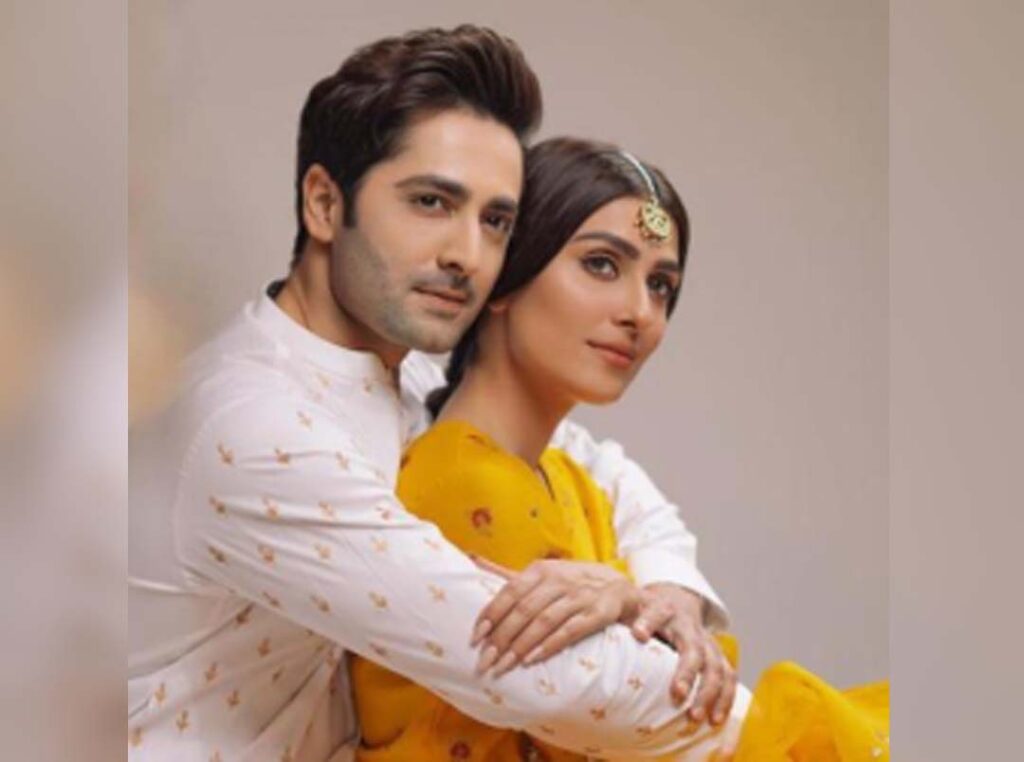
The star-studded cast can hold your attention, their acting skills can divert your mind, or you may get stuck at the slow-motion scenes. Realistically, it is not enough to make a serial more influential. The storyline is the fundamental element. If the quality of the content has been compromised for sure, it will not create any impact. Eventually, this weakens the narrative.
Likewise other dramas, Mehar posh is one of them. The drama features an ensemble cast starring, Danish Taimoor, Ayeza Khan, Ali Abbas, and Zainab Shabbir. It began with a cheerful start showcasing a family of four gearing up for the marriage of eldest daughter Mehru, played by Ayeza Khan. The story took a tragic turn, Mehru’s husband Naeem, played by Ali Abbas divorced her on the wedding night after he overheard the disrespectful entire conversation of Shah Jahan aka Danish Taimoor with his closest friends. As they were discussing Shah Jahan’s incomplete love story in a dishonorable manner.
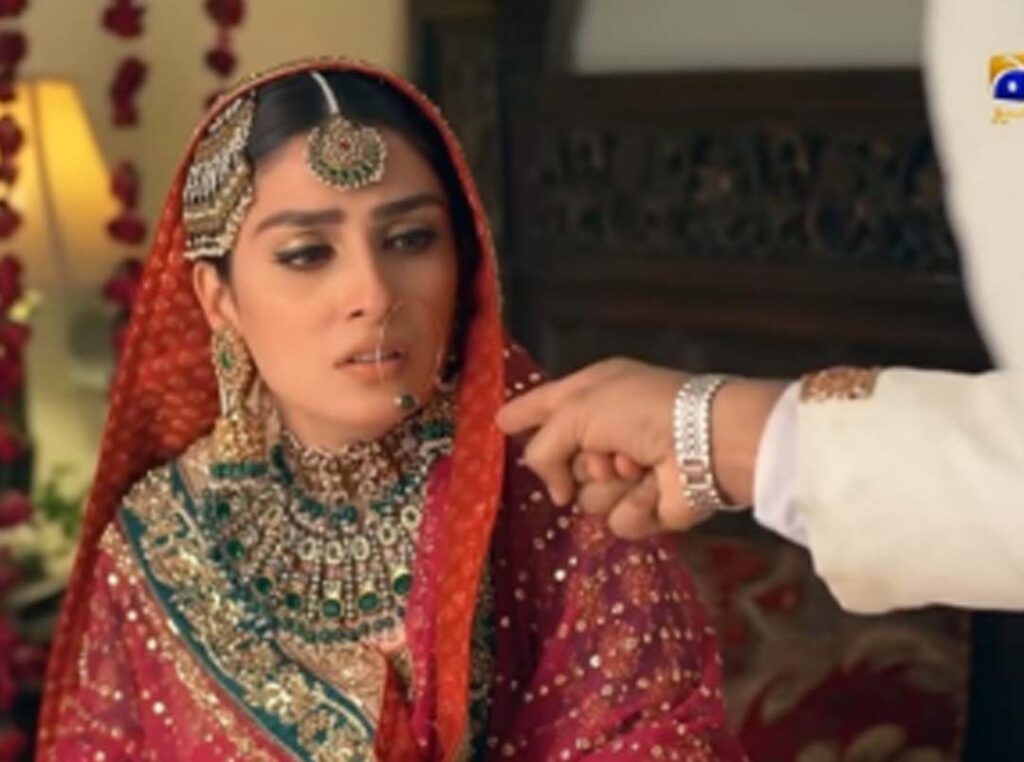
In this specific scene, the woman has been blamed, for having an affair with neighborhood men, showing that a husband is maligning his own wife’s reputation and decides to divorce her as he belongs to a respectable family. Again, it is not the first time such kinds of exchange of harsh words have been used, on mainstream media for both genders. Excessive usage of unethical words has affected the standard of dramas. Well, there is no argument that an egocentric, and chauvinist mindset exists in our society, it must be addressed, though it can mention appropriately.
ISHQ HAI
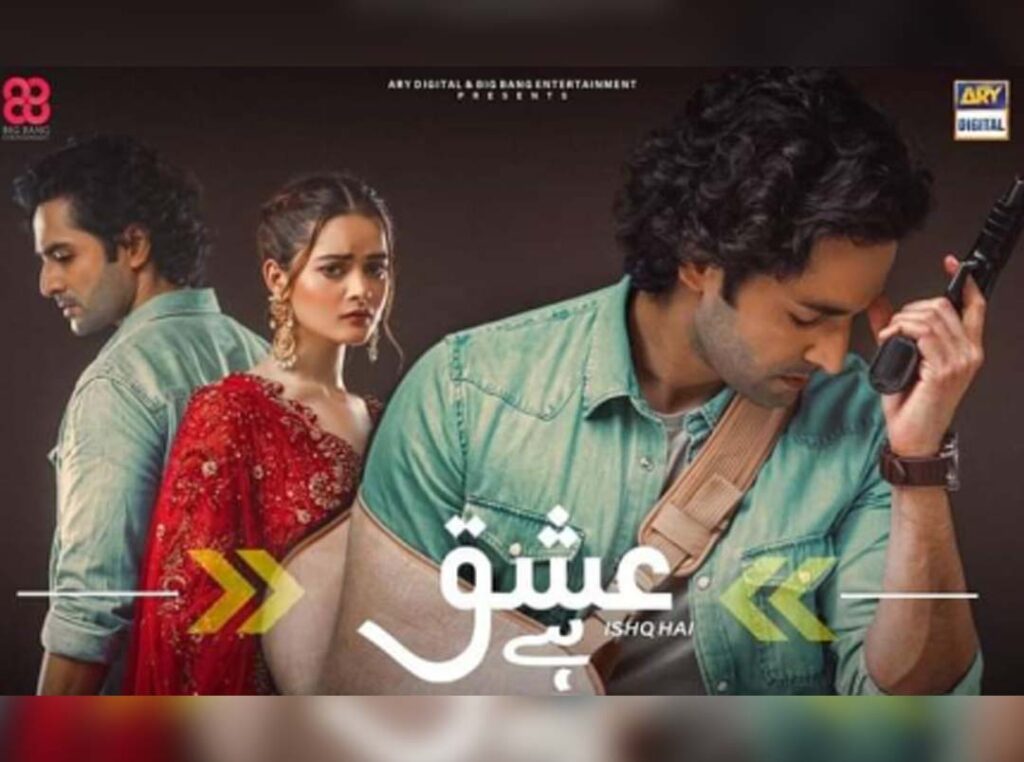
It unfolds an obsessive love story of Isra, played by Minal Khan belongs to an upper- middle class yet conservative family. On the other hand, Danish Taimoor played the role of Shahzaib, holds a well-off background. He is a possessive and hot-headed guy who is madly in love with Isra. But unfortunately, like any other tragic love story, both families were against their marriage. At last, Isra decided to marry another man for the sake of her family’s respect. However, she was kidnapped by Shahzaib on her wedding day, as he pressurized her to marry him by placing a gun on his head. As the story moves on after the marriage couple faced uncountable ups and downs, it contained many dramatic turns, which has raised valid questions.
Firstly, is it the only way to show a person who forces someone for something in a harmful manner to highlight the selfishness and peak of the impulsiveness of the character on mainstream media? Will, it does not create a negative impact on youth? A girl who is bound to marry an obsessive lover later, accepted the relationship because she had no other chance is not a flaw? What kind of message does a writer want to deliver? Are forced marriages being glorified?
Secondly, Man who forcibly married that girl whom he was madly in love due to the humanly created misunderstandings and family politics started mistrusting his wife, despite knowing all the scenarios. This sort of situation mostly happens in our dramas, which makes the plot weak.
IS VOILENCE ON MAINSTREAM MEDIA BEING NORMALISED?
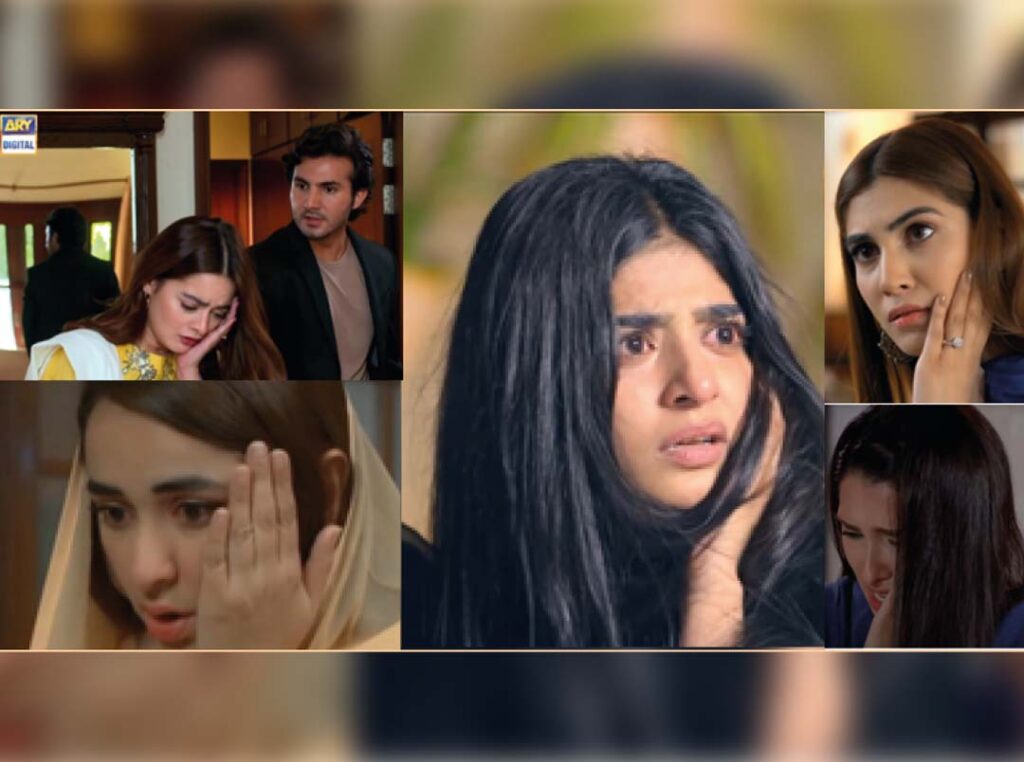
Our dramas remain incomplete without slap scenes. Mostly in every drama, a woman is being slapped by her brother, father, or husband. It has become a norm. Unfortunately, our writers are normalizing physical violence, yet another question for which they can be questioned. Whereas, in the entertainment industry, there is a thought “With controversy slap scenes also sell” when a woman is slapped the drama gets even more attention, and automatically it gains rating. If that is the case, so why netizens have spoken against it? Why do viewers show displeasure and demand to stop traditional portrayals? Indeed, it’s not a new trend. However, it’s surprising why our female actresses did not raise voices against this pattern? Arguments and disagreements can be shown gently, everyone has the right to agree to disagree, to accept and reject although ending up it on physical violence? Is it not promoting intolerance among society? verbal and physical abuse is being normalized whether it is a question is physical violence is the demand of the script? Now, this is something which needs to be discussed. Many of our actors and actresses have also shed light on, as they have said, if it is a demand of the specific scene then we have no concerns. If not, then it should be omitted.
LAAPATA SCENE, BREAKS THE TRADITIONAL NORM. WOMAN SLAPS BACK HER HUSBAND
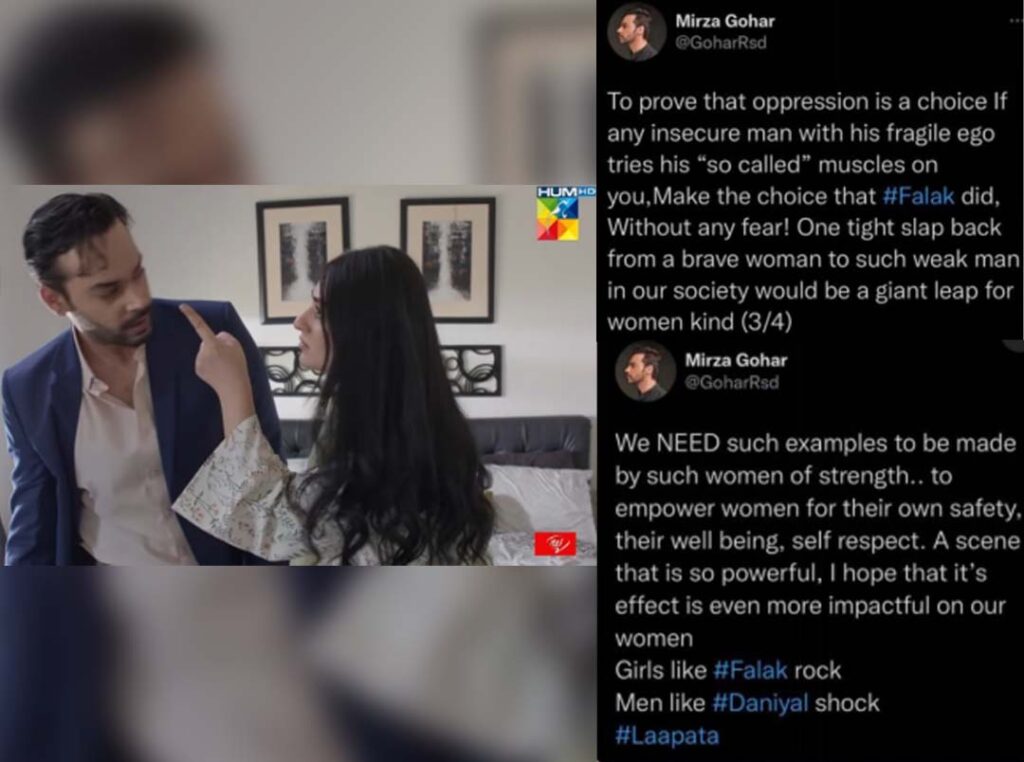
A scene of Sarah Khan and Gohar Rasheed from the recently ended serial of Hum Tv “Lapaata” went viral on social media. In an argument, Daniyal, played by Gohar Rasheed, raises his hand at his wife Falak, played by Sarah Khan, as it was a customary scene however, what makes it different from other dramas is the way Falak slaps back her husband. The scene sparked debate on social media. Netizens applauded the team for showcasing women fighting for her right, but some people called out for glorifying the violence under the banner of empowerment.
Whereas versatile actor Gohar Rasheed took to his Twitter handle and expressed his thoughts about it.
DUAL STANDARDS IN THE PLAYS
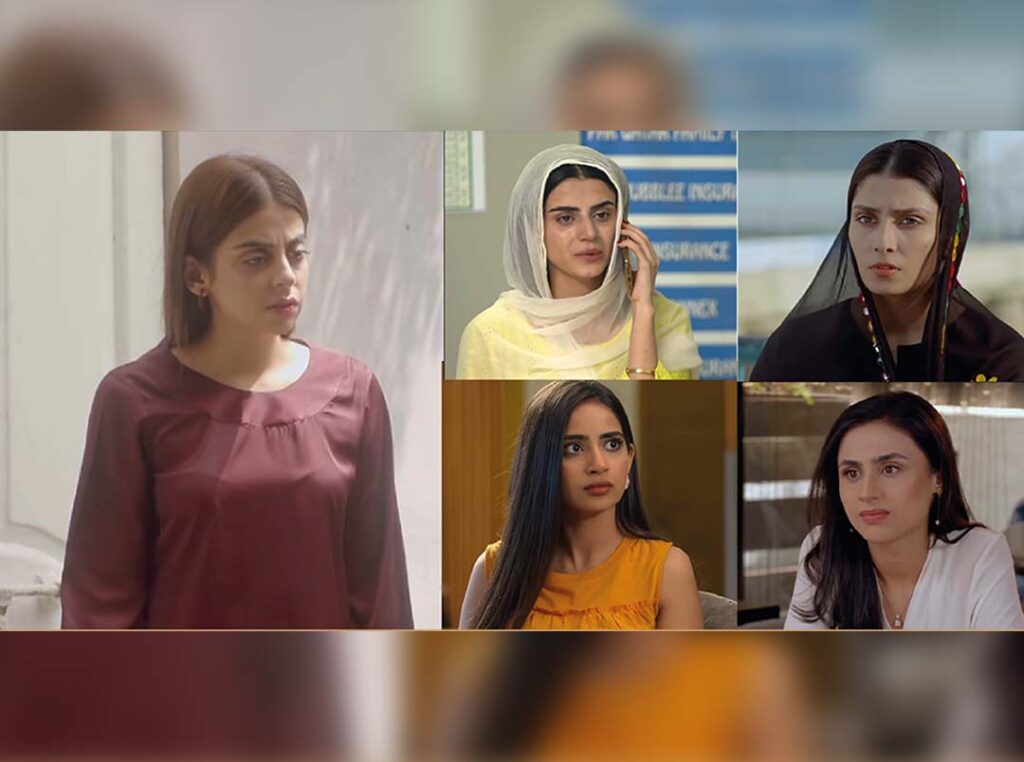
Women from middle-class families, always are shown in an appropriate dress, wearing shalwar kameez with a covered head. Although in the drama, if a female actress wears a western dress, has a rude attitude, and is shown as a selfish, manipulative, and dishonest person so, for a viewer, it is easy to understand that she belonged to a well-off background. This classification has been created through drama serials that contain no logic. Negativity and positivity do not belong to any class what matters is the individual’s mindset.
THE MORE VULGARITY, THE HIGHER THE RATING: ANWAR MAQSOOD
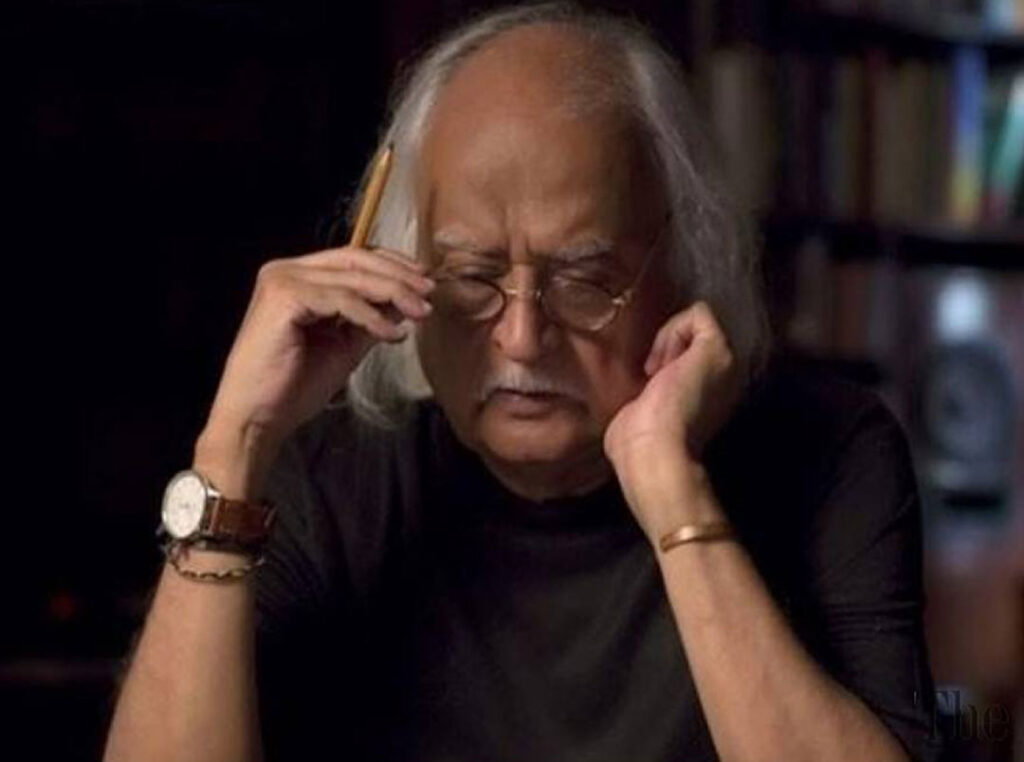
In the conversation with Omair Alavi (UOA) veteran artist Anwar Maqsood expressed his disappointment over the content of local television dramas. He said, “There are so many plays that even I can’t watch. Ratings have ruined media freedom. The more shamelessness, pointless sentences, and disrespect, the higher the rating.” Why are people not interested in creating quality content? Scriptwriter shed light on, he further added, “Now people aren’t coming in because these gadgets have taken away the love of reading and writing. People want everything from one single device. They don’t want to buy books.”

